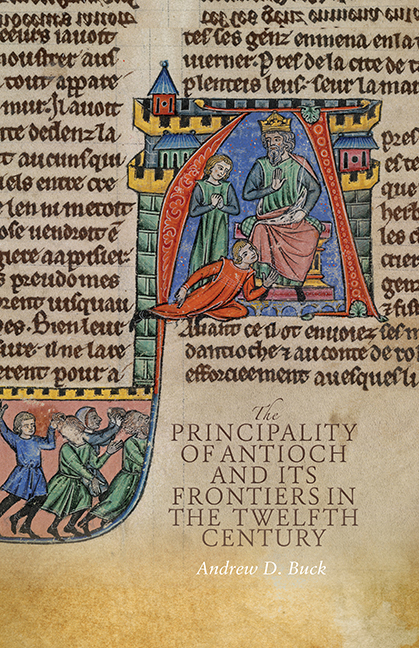Book contents
- Frontmatter
- Contents
- List of Maps
- Acknowledgements
- Abbreviations
- Introduction
- 1 The Extent of the Principality
- 2 The Rulers of Antioch
- 3 Central Governance and Military Service
- 4 Lordship in the Principality
- 5 A Frontier Society? The Nature of Intercultural Relations
- 6 Relations with Byzantium
- 7 Antioch and the Latin East
- Conclusion
- Bibliography
- Index
4 - Lordship in the Principality
Published online by Cambridge University Press: 09 May 2017
- Frontmatter
- Contents
- List of Maps
- Acknowledgements
- Abbreviations
- Introduction
- 1 The Extent of the Principality
- 2 The Rulers of Antioch
- 3 Central Governance and Military Service
- 4 Lordship in the Principality
- 5 A Frontier Society? The Nature of Intercultural Relations
- 6 Relations with Byzantium
- 7 Antioch and the Latin East
- Conclusion
- Bibliography
- Index
Summary
Landholding was an imposing challenge in the principality of Antioch. The fragile military and political world of twelfth-century northern Syria, coupled with the region's unique topographical and religious variances, meant Latin settlers faced multi-faceted threats to their presence and security. For Cahen, and to a large extent Mayer, this allowed the powerful ruling house to keep a strong hold over the nobility through its military and political dominance. Martin has likewise noted Antioch's robust rulership, arguing that effective challenges to supremacy were prevented by the retention of key towns and cities within the princely demesne. Despite this, he also accepts that the Assises dAntioche, created as it was through a process of negotiation (a sentiment echoed by Edbury), reflect an aristocracy heavily focused on their own rights, and that direct princely control over Antioch's landholding, as exercised through the office of the secreta, eventually became more relaxed than elsewhere, particularly Norman Sicily.3 Asbridge went further, as in spite of recognising princely influence over charter creation in the principality's lordships, he also argued for the establishment – before 1130 – of a number of independent seigneuries which he classified as holding ‘marcher’ status: thus echoing the independent lordships seen on the Anglo-Welsh borders during the twelfth and thirteenth centuries. The holders of these fiefs, in the interests of defence, were thus granted a level of hereditary status and freedom from centralised control. The diversity of opinion here helps to introduce the difficulties inherent to this discussion, yet is not unique to the principality. Indeed, traditional notions of a deeply entrenched and powerful nobility in the kingdom of Jerusalem, such as that proposed by La Monte and Prawer, have since been challenged by Tibble, who instead highlighted the frequency and effectiveness of royal intervention in aristocratic matters. Moreover, modern studies on the interplay between central authority and frontier lordships on the disputed borderlands of the West have also emphasised the varied nature of relations.
- Type
- Chapter
- Information
- Publisher: Boydell & BrewerPrint publication year: 2017



